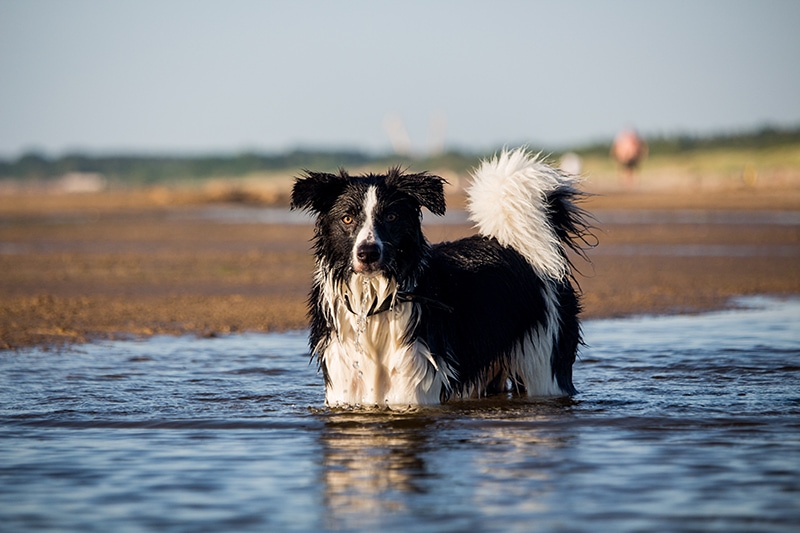Why Do My Dogs Ears Smell? 4 Vet Reviewed Reasons
Updated on
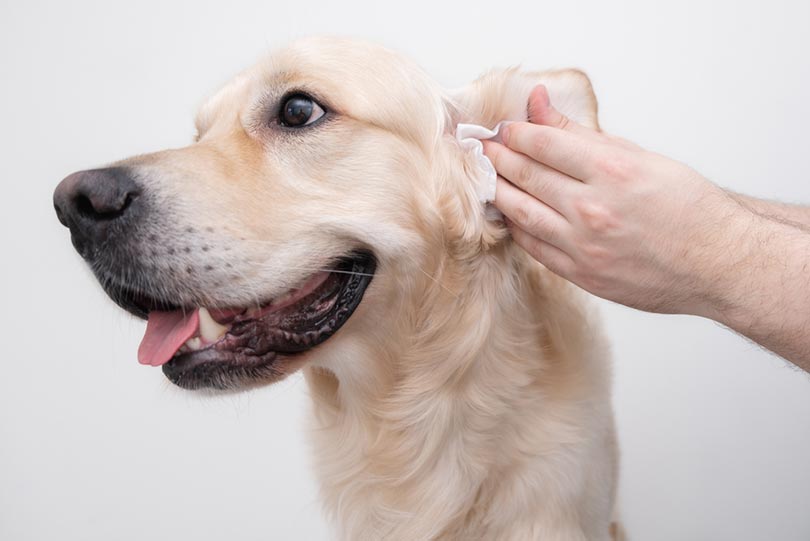
One of the normal parts of owning a dog is their occasional unpleasant smell, and this can sometimes include their ears. Though small amounts of visible ear wax isn’t necessarily cause for great concern, an unpleasant odor from your pup’s ears needs veterinary attention. If you are wondering why your dog’s ears smell, you came to the right place.
In this article, we’ll tell you why this is happening and how to fix this problem.
Signs There Are Problems with Your Dog’s Ears
An unpleasant odor from your dog’s ears is a very good sign that there may be a problem with the ears. In addition to the odor, you may notice these signs in your pup as well.
- Different colored ear debris, from brown to yellow
- Constant scratching of the ears
- Redness and loss of hair from all the scratching
- Ears are swollen
- Nodding the head from side to side
- Aggressive behavior when trying to touch their ears
The 4 Vet-Reviewed Reasons Why Your Dogs Ears Smell
1. Ear Wax Buildup
Dogs’ ears are very similar to ours, so not cleaning their ears regularly can cause some problems. Ear wax can appear in different colors, from brown to yellow. Even though small amounts of ear wax won’t hurt a dog, ear wax buildup can cause problems like blocking the ear canal. The buildup of earwax can also cause an unpleasant odor.
Some dog breeds, such as the Cocker Spaniel, may be genetically predisposed to producing high amounts of earwax. Dogs with very long ear canals (such as Bassets), dogs with excessive ear folds (such as English Bulldogs), and dogs with excessive hair in their ear canals (such as Poodles) may have an increased likelihood of ear wax issues.
Dogs with issues that irritate their ears (such as mites or allergies) may also produce excessive amounts of foul-smelling ear wax. Your dog’s activities may also be a contributing factor; dogs that swim frequently are more likely to develop excessive ear wax. If you see an excessive wax build up in your dog’s ears, you should bring your dog to the vet for an ear examination.
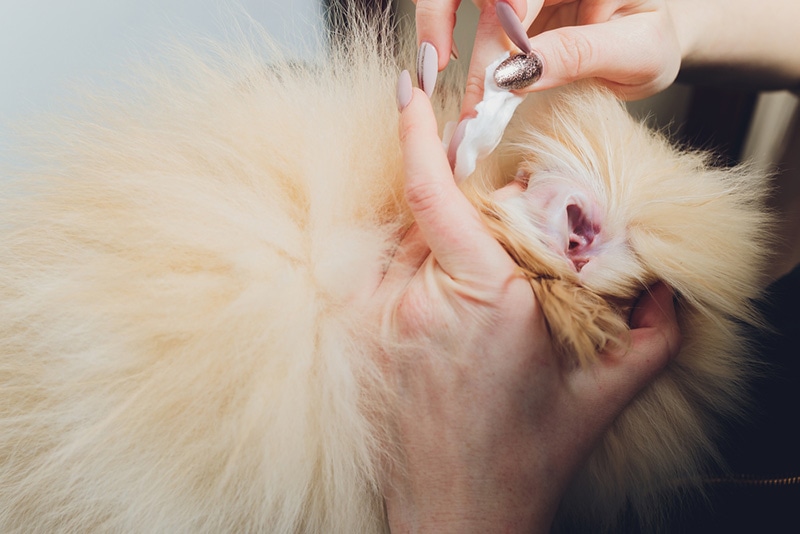
2. Outer Ear Infections
Outer ear infection, also called otitis externa, is an inflammatory disease of the external ear canal of dogs.
- Ear canal conformation: the unique conformation of your pup’s ears may predispose them to developing this ailment.
- Moisture: activities such as swimming, or hot and humid environments may contribute to otitis externa.
- Allergies: this remains the primary cause for an inflammation of your pup’s outer ear canal.
- Foreign bodies lodged in the ear canal may lead to an inflammation.
- Certain endocrine diseases, such as hypothyroidism, may be associated with otitis externa.
- Tumors or other growths may also perpetuate or exacerbate inflammation of the ears.
- Bacterial infections
- Yeast overgrowth or infections
Treating otitis externa is very important because it can quickly develop into an inner and middle ear canal infection. The first signs you will see are your dog scratching its ears a lot and a characteristic odor coming from your dog’s ears.
3. Other Ear Infections
A similar process can also happen with the middle or inner ear, a condition called otitis media or interna, respectively. Internal ear infections can cause severe problems and even deafness, so you must seek veterinary help as soon as you see the signs of the infection, which includes an unpleasant odor.
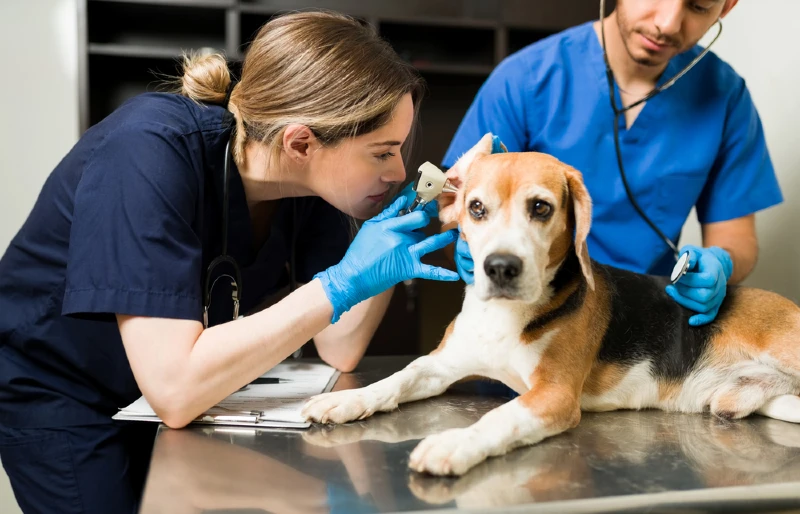
4. Ear Mites
One of the first things you will see when ear mites are present is your dog shaking their head very fast or scratching their ears, and that’s because of the itching caused by the ear mites. These mites may also cause a bad odor. Ear mites can pass from one animal to another, but they rarely go after humans. It is crucial to contact your vet if you suspect that your dog has ear mites. That’s because ear mites cannot easily be detected with the human eye, so your vet would use an otoscope to diagnose it properly.
How to Clean a Dog’s Ears
If you want to keep your dog healthy and happy, you need to maintain their hygiene, and this includes cleaning their ears. The first thing you need to do when ear cleaning is to check if your dog’s ears actually need cleaning, because over-cleaning your dog’s ears can also cause some issues.
You would always want this to be a pleasant experience for your dog, so try giving them a treat to make this process easier. When your dog is calm, gently squeeze a dog-safe ear cleaner into the canal and leave it in for about 30 seconds. When that’s done, your dog will probably start nodding their head, so grab a towel to protect you from the ear debris and also to clean what’s left in the base of the ear.
A Q-tip can be used to gently remove debris and wax from your dog’s ear flap (also known as the pinna), however you should not poke your dog with the Q-tip. In addition, you shouldn’t attempt to “scoop out” wax from their ear canal using the Q-tip; this often harms your pup and makes things worse by disrupting the ear’s natural cleaning mechanism.
Only remove wax that’s well formed and on the inner side of the flap, away from the canal itself.
This process is for regular ear cleaning, but if you suspect your dog has other problems like infections or ear mites, we suggest you contact a veterinarian as soon as possible.
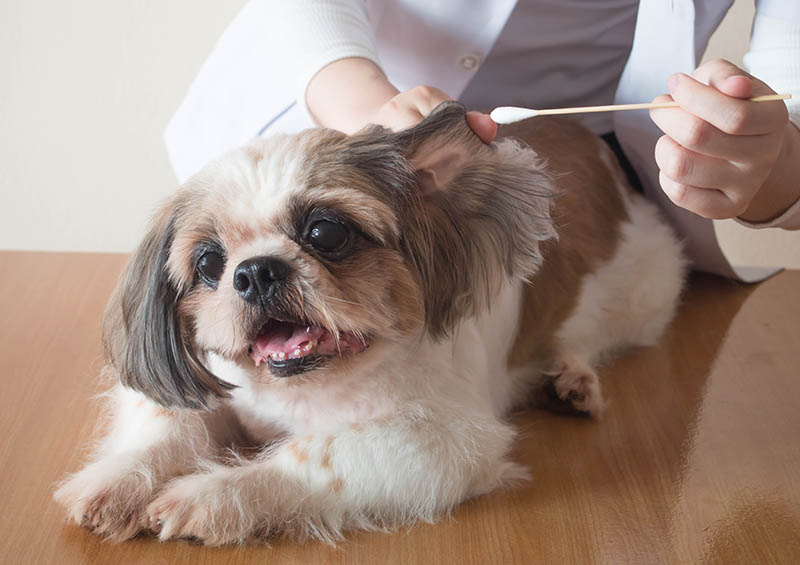
Conclusion
Even though keeping your dog happy and healthy can sometimes be challenging, it is very important. We hope you found this article helpful, and that you’ve found the reason why your dog’s ears are smelling. Most ear ailments can be resolved quickly with prompt veterinary care. Therefore, to stop this from becoming a chronic issue, take your dog for regular examinations with a vet.
Featured Image Credit: Kashaeva Irina, Shutterstock






